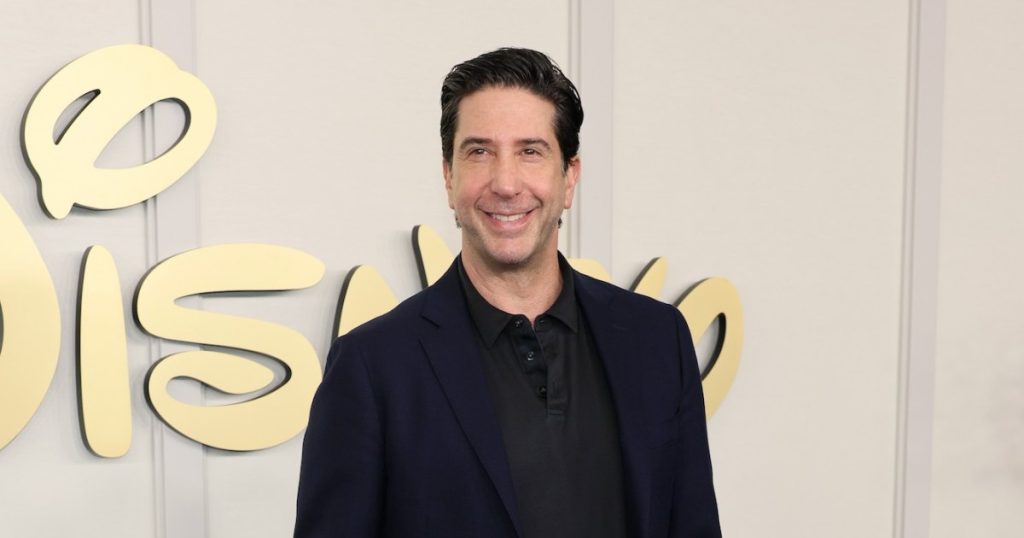David Schwimmer, renowned for his portrayal of Ross Geller in the iconic sitcom “Friends,” recently shared a rather uncomfortable anecdote about his experience guest-hosting Saturday Night Live (SNL) in 1995. During an appearance on The Late Show with Stephen Colbert, Schwimmer recounted the incident, revealing the unexpected frostiness he encountered from the SNL writing staff upon his arrival. At the peak of “Friends” popularity, Schwimmer, a college acquaintance of Colbert’s from their shared theatre student days, received the prestigious invitation to host SNL, an honor he understandably embraced with enthusiasm. However, due to the demanding “Friends” shooting schedule, which often stretched into the early hours of Wednesday mornings, Schwimmer’s arrival in New York for SNL preparations was delayed until Thursday, just two days before the live show. This seemingly minor scheduling conflict proved to be the crux of the issue.
Upon entering the SNL writers’ room, Schwimmer was met with a chilling reception. The writers, he recalled, glared at him with a palpable animosity, leaving him bewildered and feeling as though he had committed some unforgivable offense. He described the experience as “traumatizing,” and the unexpected hostility cast a shadow over the remaining two days of preparation. Despite the unsettling atmosphere, Schwimmer persevered, navigating the rehearsals and ultimately performing his hosting duties, although the specifics of the show itself remain hazy in his memory.
The mystery surrounding the writers’ frosty demeanor remained unsolved for years. Schwimmer later learned from another former SNL host that the expected arrival time for guest hosts was Monday, not Thursday. This crucial piece of information had never been communicated to him, leaving him to unknowingly bear the brunt of the writers’ misplaced resentment. The misunderstanding, stemming from a simple lack of communication, had created an unnecessarily awkward and unpleasant experience for the actor.
Decades later, the incident resurfaced when Schwimmer received an invitation to SNL’s 50th-anniversary celebration. The invitation triggered a wave of anxiety and uncertainty, prompting him to question whether the writers still harbored ill feelings towards him or if the invitation was merely a clerical oversight. He expressed his apprehension to Colbert, comparing his situation to Charlie Brown’s perpetual disappointment with Lucy and the football. Schwimmer’s trepidation about facing potential rejection once again underscored the lasting impact of the initial negative experience.
Colbert, sensing his friend’s apprehension, encouraged him to attend the anniversary event, assuring him that it was a significant occasion. Ironically, Colbert himself had not received an invitation despite his past association with the show. He playfully suggested accompanying Schwimmer as his “plus one,” injecting humor into the situation and offering moral support to his friend. Schwimmer, relieved and amused by Colbert’s offer, readily accepted, sealing the pact with a handshake. The exchange highlighted their camaraderie and Colbert’s empathy for Schwimmer’s predicament.
This seemingly trivial incident of miscommunication speaks volumes about the pressures and expectations surrounding live television production. The demanding schedules, coupled with the creative intensity of the environment, can easily lead to misunderstandings and heightened sensitivities. Schwimmer’s experience serves as a reminder of the importance of clear communication and the potential consequences of even minor logistical oversights. His anecdote, shared with humor and self-deprecation, provided a glimpse behind the scenes of SNL and the sometimes-unseen challenges faced by guest hosts navigating the fast-paced world of live television. The story ultimately concludes on a lighter note, with the prospect of Schwimmer and Colbert attending the anniversary celebration together, transforming a potentially awkward situation into an opportunity for shared amusement and camaraderie.

